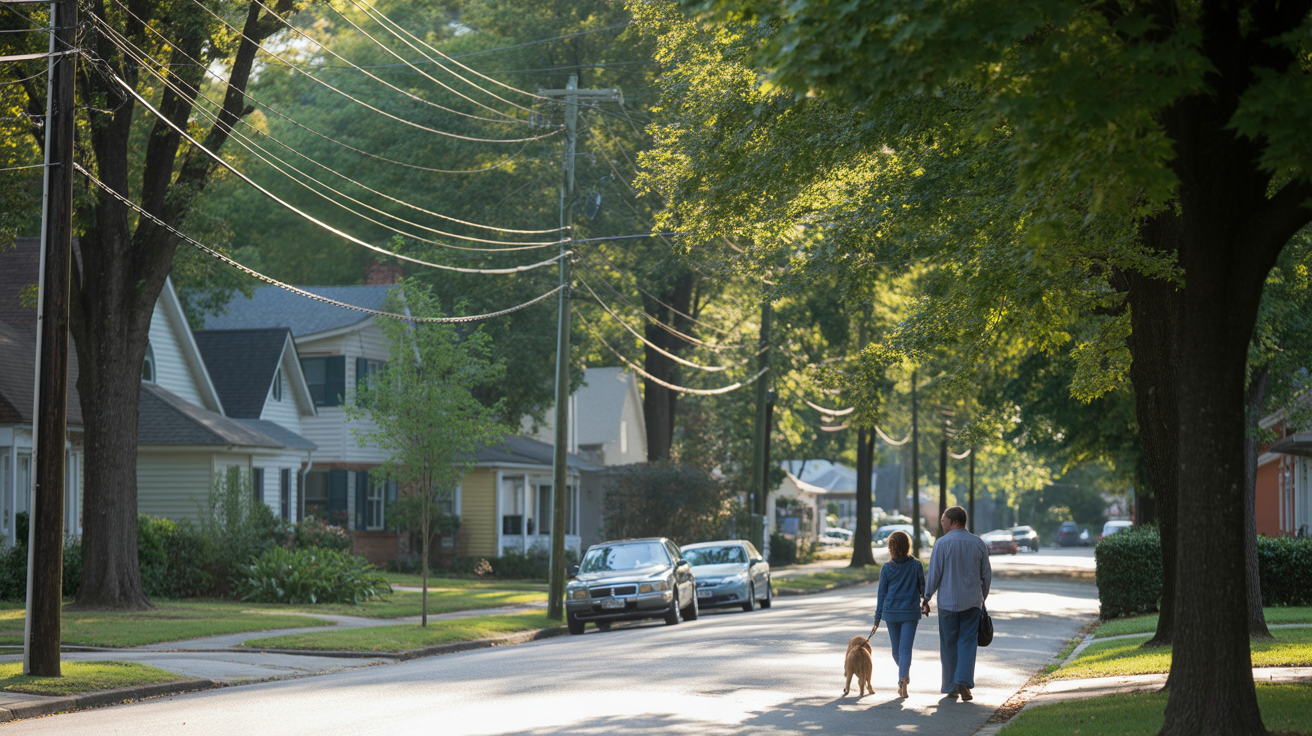Garner, NC vs. Cary, NC: Cost of Living Comparison (2025)
This article provides a cost of living comparison between Garner and Cary, North Carolina. It is perfect for families relocating, professionals choosing between job offers, or anyone comparing the real-life cost of living in Garner vs Cary in 2025. All income figures are expressed in gross monthly income (pre-tax).

1. Housing Costs
Housing is often the biggest factor in cost of living differences. Here’s how typical rent and mortgage costs compare in Garner and Cary:
| Housing Type | Garner | Cary |
|---|---|---|
| 2BR Apartment (Rent) | $1,250 | $1,600 |
| 3BR Home (Mortgage) | $1,400 | $2,100 |
🏆 Winner: Garner. Housing costs are significantly lower in Garner compared to Cary, with potential savings of $350-700 per month.
2. Utilities and Energy Costs
Utility costs are fairly similar between the two cities, but Garner has slightly lower rates on average. Expect monthly utility bills around:
- Garner: $180-220
- Cary: $200-250
Both cities experience hot summers and mild winters. Costs peak in July and August due to air conditioning use. Average monthly expenses in Garner provide a helpful overview.
🏆 Winner: Garner edges out Cary with marginally lower utility rates.
3. Groceries and Daily Expenses

Grocery costs are comparable in Garner and Cary. Expect to spend around $350-450 per month for a typical family. Restaurant prices are also similar.
However, Cary has more upscale grocery and dining options, which can increase costs for those who frequent specialty stores. Cost of living in Garner: Your monthly budget guide for 2025 breaks this down further.
🏆 Winner: Tie. Grocery and daily costs are very close between the two cities.
4. Taxes and Fees
Both Garner and Cary have a property tax rate around 0.35%. However, Cary’s higher home values mean the actual tax paid is often higher.
HOA fees are more common in Cary neighborhoods, ranging from $100-300 per month. Garner has fewer neighborhoods with HOAs.
🏆 Winner: Garner. Lower home values and fewer HOAs give Garner the advantage.
Cost Summary
| Category | Garner | Cary |
|---|---|---|
| Housing | $1,250 – $1,400 | $1,600 – $2,100 |
| Utilities | $180 – $220 | $200 – $250 |
| Groceries | $350 – $450 | $350 – $500 |
| Transportation | $60 – $80 | $50 – $70 |
| Taxes & Fees | $250 – $400 | $350 – $600 |
| Misc | $200 – $300 | $250 – $400 |
| Estimated Monthly Total | $2,290 – $2,850 | $2,800 – $3,920 |
Lifestyle Fit
While Garner is more affordable, Cary offers a bit more in terms of amenities, parks, and walkability. Cary is about 5°F cooler on average in the summer compared to Garner.
Garner provides easier access to Raleigh, with lighter traffic and a shorter average commute. It has a smaller, hometown feel.
Cary is a larger city with more shopping, dining, and recreation options. It’s a bit more spread out, so a car is helpful to get around.
Frequently Asked Questions
Is Garner more affordable than Cary?
Yes, Garner is generally more affordable, especially when it comes to housing. Expect to pay 20-30% less for comparable homes or apartments.
Which city has lower rent?
Garner has lower average rent prices. A typical 2BR apartment runs about $1,250, compared to $1,600 in Cary.
Where is it cheaper to buy a home?
Garner is more affordable for homebuyers. Median home prices are around $250,000, while Cary averages closer to $400,000.
Conclusion
Overall, Garner offers a lower cost of living, particularly for housing and taxes. It’s a great fit for those prioritizing affordability and proximity to Raleigh.
Cary is a bit pricier but provides more extensive amenities, recreation, and a variety of neighborhoods. It appeals to families and professionals who value these extras.
Ultimately, both cities provide a high quality of life in the Triangle area. We recommend visiting each to get a feel for which fits your lifestyle and budget. Be sure to check out our other cost of living guides for cities across North Carolina!
